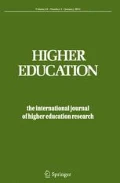Abstract
The validation of models of “good” teaching is discussed in terms of students' learning, and opinions of teaching are considered in this context. First-year university students were asked their opinions about good teaching and 40 items were derived from the interview data. The appropriate student population (2300) was then asked to rate the items for (a) Importance, and (b) Typicality. Discrepancies between ideal and typical teaching were derived for the whole sample and six different degree groups. Generally, the groups have similar opinions but there are significant differences depending upon the discipline studied and specific teaching experiences. Ratings were factor-analysed to reveal the underlying dimensions. The model of good teaching is characterised by two general factors — the first is learning-centred, the second associated with teaching — together with some minor specific factors. No general factors are associated with the “typical” models which tend to be more complex. Some methodological and practical implications of the results are discussed.
Similar content being viewed by others
References
Bendig, A. W. (1953). “An inverted factor analysis study of student-rated introductory psychology instructors,”Journal of Experimental Education 21: 333–336.
Bendig, A. W. (1954). “A factor analysis of student ratings of psychology instructors on the Purdue scale,”Journal of Educational Psychology 43: 385–393.
Brew, Angela and McCormick, Bob (1979). “Student learning and an independent study course,”Higher Education 8: 443–451.
Clinton, R. J. (1930). “Qualities college students desire in college instructors,”School and Society 32: 702.
Coffman, William E. (1954). “Determining students' concepts of effective teaching from their ratings of instructors,”Journal of Educational Psychology 45: 277–286.
Crannell, C. W. (1953). “A preliminary attempt to identify the factors in student-instructor evaluation,”Journal of Psychology 36: 417–422.
Crawford, P. L. and Bradshaw, H. L. (1968). “Perceptions of characteristics of effective university teachers: a scaling analysis,”Educational and Psychological Measurement 28: 1079–1085.
Creager, J. A. (1950). “A Multiple Factor Analysis of the Purdue Rating Scale for Instructors.” Unpublished Masters Thesis. Purdue University.
Dubin, Robert and Taveggia, T. (1969).The Teaching-Learning Paradox. Eugene, OR: University of Oregon Press.
Echandia, P. P. (1964). “A methodological study and factor analytic validation of forcedchoice performance rating of college Accounting instructors,”Dissertation Abstracts 25 (4): 2605–2606.
Entwistle, Noel, Hanley, Maureen and Hounsell, Dai (1979). “Identifying distinctive approaches to studying,”Higher Education 8: 365–380.
French, G. M. (1957). “College students' concepts of effective teaching determined by an analysis of teacher ratings,”Dissertation Abstracts 17: 1380–1381.
Gaff, J. G., Crombag, H. F. M. and Chang, T. M. (1976). “Environments for learning in a Dutch university,”Higher Education 5: 285–299.
Gibb, C. A. (1955). “Classroom behaviour of the College teacher,”Educational and Psychological Measurement 15: 254–263.
Gibbs, Graham, Morgan, Alistair and Taylor, Liz (1980). “Understanding why students don't learn,”S. M. G. Report 5, I. E. T. The Open University, Milton Keynes.
Goldschmid, Marcel L. (1978). “The evaluation and improvement of teaching in higher education,”Higher Education 7: 221–245.
Greenwood, Gordon E., Bridges, Charles M. Jr., Ware, William B. and McLean, James E. (1973). “Student evaluation of college teaching behaviours instrument: A factor analysis,”Journal of Higher Education 44: 596–604.
Hajnal, J. (1972).The Student Trap. Harmondsworth, Middlesex: Penguin Books.
Isaacson, Robert L., McKeachie, Wilbert J. and Millholland, John E. (1964). “Dimensions of student evaluation of teaching,”Journal of Educational Psychology 55: 344–351.
Johnson, Henry C. Jr., Rhodes, Dent M. and Rumery, Robert E. (1975). “The assessment of teaching in higher education: Part I: A critical retrospect. Part II: A proposal,”Higher Education 4: 173–199, 273–303.
Jones, John (1979a). “Students' views of the roles of a university,”Higher Education 8: 513–524.
Jones, John (1979b), “University roles and effective learning,” pp. 1769–1777 inProceedings of Fifth International Conference on Improving University Teaching. University of Maryland and City University, London.
Jones, John (1979c).Physics Interface. Higher Education Research Office, University of Auckland.
Kulik, James A. and McKeachie, Wilbert J. (1975). “The evaluation of teachers in higher education,”Review of Research in Education 3: 210–240.
Laurillard, Diana (1979). “The process of student learning,”Higher Education 8: 395–409.
Levinthal, C. F., Lansky, L. M. and Andrews C. (1971). “Student evaluations of teacher behaviours as estimations of real-ideal discrepancies: A critique of teacher rating methods,”Journal of Educational Psychology 62: 104–109.
Marton, Ference (1976). “What does it take to learn? Some implications of an alternative view of learning,” pp. 32–43 in N. J. Entwistle (ed.),Strategies for Research and Development in Higher Education. Amsterdam: Swets and Zeitlinger.
Matthias, Haydn S. (1980). “Science students' approaches to learning,”Higher Education 9: 39–51.
Naftulin, D. H., Ware, J. E. and Donnelly, F. A. (1973). “The Dr. Fox lecture: A paradigm of educational seduction,”Journal of Medical Education 48: 630–635.
Parlett, M. and Hamilton, D. (1972).Evaluation as Illumination: A new Approach to the Study of Innovatory Programmes. Centre for Research in the Educational Sciences, University of Edinburgh, Occasional Paper No. 9.
Perlberg, Arye (1979). “Evaluation of instruction in higher education: some critical issues,”Higher Education 8: 141–157.
Pogue, F. G. Jr. (1967). “Students' ratings of the ‘Ideal Teacher’,”Improving College and University Teaching 15: 133–136.
Powell, J. P. (1976).Competent Teaching: Some Pre-requisites and Some Implications. TERC Monograph 11, University of N. S. W., Sydney, Australia.
Ramsden, Paul (1979). “Student learning and perceptions of the academic environment,”Higher Education 8: 411–427.
Rokeach, Milton (1973).The Nature of Human Values. New York: Free Press.
Saljo, Roger (1979). “Learning about learning,”Higher Education 8: 443–451.
Siegel, L. (1968). “The contributions and implications of recent research related to improving teaching and learning,” in O. Milton, and E. J. Shoben, (eds.),Learning and the Professors. Ohio: Ohio University Press.
Smalzied, N. T. and Remmers, H. H. (1943). “A factor analysis of the Purdue rating scale for instructors,”Journal of Educational Psychology 34: 363–367.
Solomon, D. (1966). “Teacher behaviour dimensions, course characteristics and student evaluation of teachers,”American Educational Research Journal 3: 35–47.
Author information
Authors and Affiliations
Rights and permissions
About this article
Cite this article
Jones, J. Students' models of university teaching. High Educ 10, 529–549 (1981). https://doi.org/10.1007/BF01676900
Issue Date:
DOI: https://doi.org/10.1007/BF01676900




